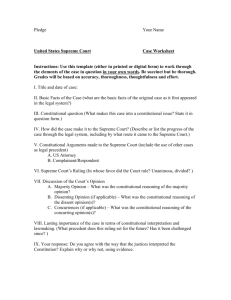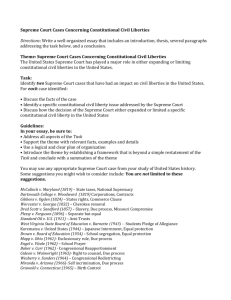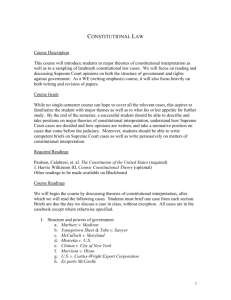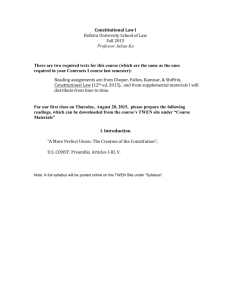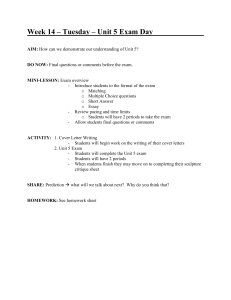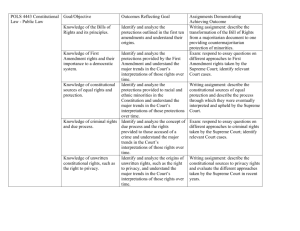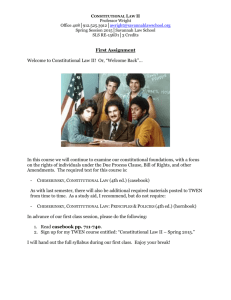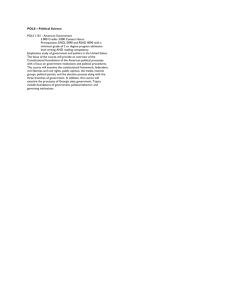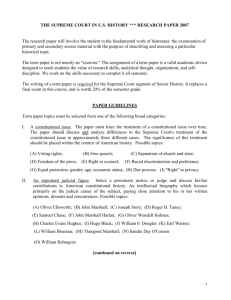POLI 211
advertisement
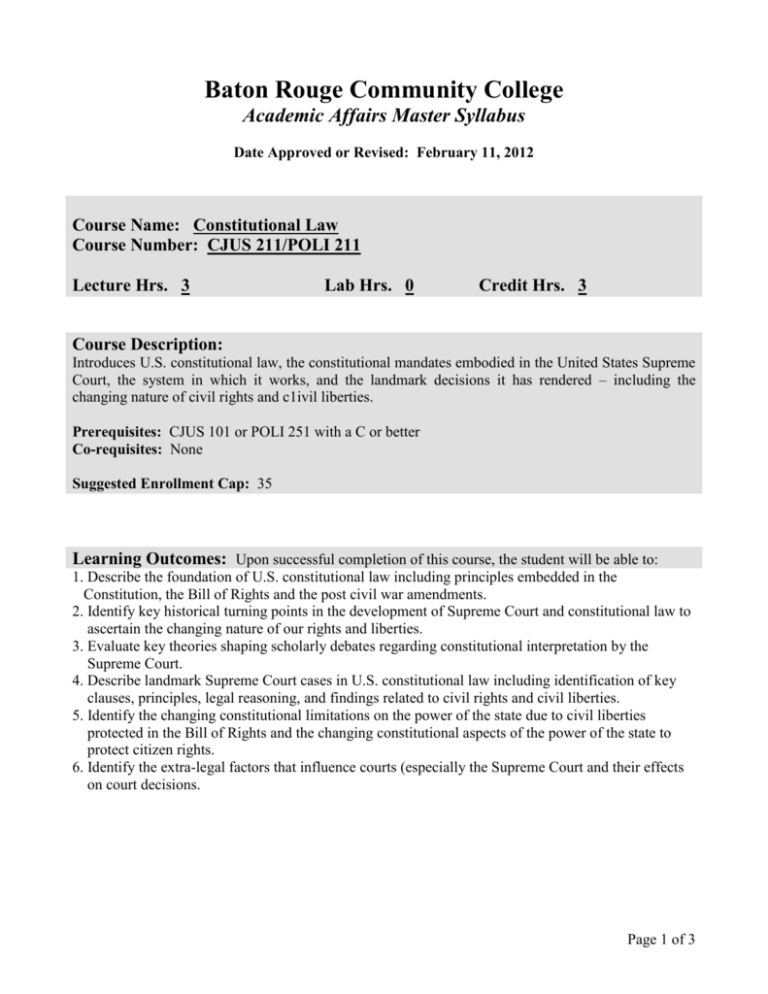
Baton Rouge Community College Academic Affairs Master Syllabus Date Approved or Revised: February 11, 2012 Course Name: Constitutional Law Course Number: CJUS 211/POLI 211 Lecture Hrs. 3 Lab Hrs. 0 Credit Hrs. 3 Course Description: Introduces U.S. constitutional law, the constitutional mandates embodied in the United States Supreme Court, the system in which it works, and the landmark decisions it has rendered – including the changing nature of civil rights and c1ivil liberties. Prerequisites: CJUS 101 or POLI 251 with a C or better Co-requisites: None Suggested Enrollment Cap: 35 Learning Outcomes: Upon successful completion of this course, the student will be able to: 1. Describe the foundation of U.S. constitutional law including principles embedded in the Constitution, the Bill of Rights and the post civil war amendments. 2. Identify key historical turning points in the development of Supreme Court and constitutional law to ascertain the changing nature of our rights and liberties. 3. Evaluate key theories shaping scholarly debates regarding constitutional interpretation by the Supreme Court. 4. Describe landmark Supreme Court cases in U.S. constitutional law including identification of key clauses, principles, legal reasoning, and findings related to civil rights and civil liberties. 5. Identify the changing constitutional limitations on the power of the state due to civil liberties protected in the Bill of Rights and the changing constitutional aspects of the power of the state to protect citizen rights. 6. Identify the extra-legal factors that influence courts (especially the Supreme Court and their effects on court decisions. Page 1 of 3 General Education Learning Outcomes: This course supports the development of competency in the following areas. Students will: 3. Think critically, independently, and creatively and make informed and logical judgments of the arguments of others, arrive at reasoned and meaningful arguments and positions, and formulate and apply ideas to new contexts; 10. Demonstrate knowledge of American democracy, an awareness of the responsibilities of informed citizenship in a diverse and pluralistic society, and a willingness to contribute through participation and service. Assessment Measures: Department will administer post exam linked to SLOs. Professor/instructor will administer exams and/or quizzes. Professor/instruction will administer a common end of semester exam. Professor/instructor will assign a Supreme Court case brief on an introductory level. Information to be included on the Instructors’ Course Syllabi: Disability Statement: Baton Rouge Community College seeks to meet the needs of its students in many ways. See the Office of Disability Services to receive suggestions for disability statements that should be included in each syllabus. Grading: The College grading policy should be included in the course syllabus. Any special practices should also go here. This should include the instructor’s and/or the department’s policy for make-up work. For example in a speech course, “Speeches not given on due date will receive no grade higher than a sixty” or “Make-up work will not be accepted after the last day of class.” Attendance Policy: Include the overall attendance policy of the college. Instructors may want to add additional information in individual syllabi to meet the needs of their courses. General Policies: Instructors’ policy on the use of things such as beepers and cell phones and/or hand held programmable calculators should be covered in this section. Cheating and Plagiarism: This must be included in all syllabi and should include the penalties for incidents in a given class. Students should have a clear idea of what constitutes cheating in a given course. Safety Concerns: In some programs this may be a major issue. For example, “No student will be allowed in the safety lab without safety glasses.” General statements such as, “Items that may be harmful to one’s self or others should not be brought to class.” Page 2 of 3 Library/ Learning Resources: Since the development of the total person is part of our mission, assignments in the library and/or the Learning Resources Center should be included to assist students in enhancing skills and in using resources. Students should be encouraged to use the library for reading enjoyment as part of lifelong learning. Expanded Course Outline: I. Course introduction II. Constitutional law and constitutionalism in relation to U.S. founding principles related to the rule of law. III. The U.S. constitution including the Bill of Rights and post-civil war amendments. IV. The History and Role of the Supreme Court. V. Judicial Review and Theories of Judicial Interpretation. VI. First Amendment Freedoms - Freedom of Speech/Press VII. First Amendment Freedoms – Freedom of Religion – Establishment and Freedom of exercise clauses. VIII. Civil Rights IX. Right to Privacy. X. Rights of the accused – Due Process amendments. XI. Equal Protection XII. Contemporary landmark Cases Page 3 of 3
